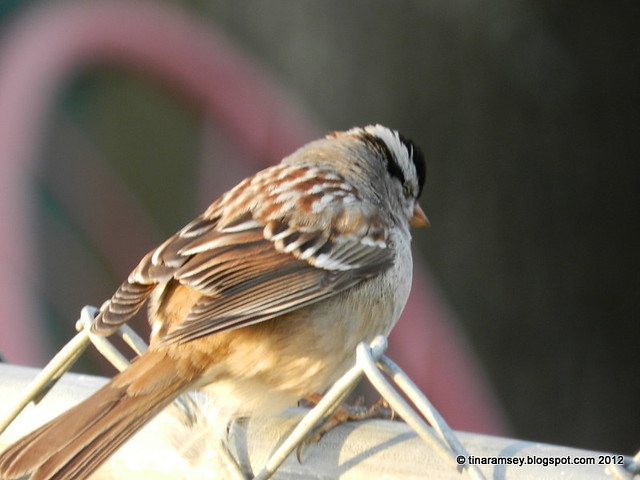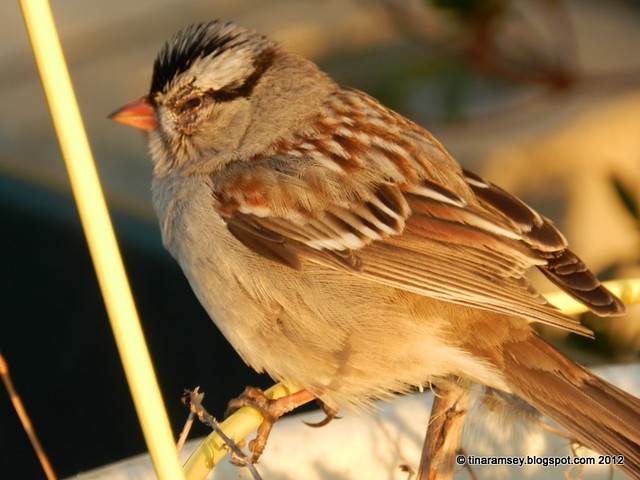
At first glance the above picture seems like all is well. The picture depicts just another white crowned sparrow hanging out.

But when we look closer we see the sparrow's eyes are covered with what appears to be an infection of some kind; probably house finch disease. House finch disease is not a disease at all but primarily a respiratory infection. Like all respiratory infections this infection can spread like wildfire among birds. It is best to remove feeders for a while to keep the birds from congregating and spreading the germ between each other. I don't feed the birds in the regular sense so I was rather surprised to see this sick bird. It did not live more than a few minutes after I took its picture. My dog Lady, who is always a hunter, quickly ended the bird's suffering. The bird could not see. Without vision birds are helpless even if predators are not around. It's always sad seeing this in nature....
in the garden....
Words and Photos Property of In the Garden Blog Team, In the Garden
This is so sad, but then again there are so many things we are helpless to do anything about. I noticed this weekend some of the birds gathering materials for nests. That seems very early to me, and I know some of the nests will no doubt be blown down by spring storms. I don't know much about birds--I wonder if this year there might be several broods?
ReplyDeleteInformative. Hopefully there won't be an epidemic. Our winter was so mild here that we didn't use feeders for the first time. The birds never finished off the berries on the hollies and I still had coneflower and susan seed heads standing in the garden until cutting back a few weeks ago.
ReplyDeleteThis is so sad. I love to watch the birds. I hope there isn't an epidemic in the making.
ReplyDeleteOh dear, it is very sad but part of life. I wonder if there is something you can put in the food to help with it but probably not or you would have mentioned it. I will go and read the link about the infection now. I have been and continue to be worried about the effects of the "winter" we had (or did not have) on every thing. We have already been told the pollen, bugs and weeds will be worse. I wonder if this is another side effect.
ReplyDeleteOh my, will have to keep a close eye on the finches and others here. Poor little bird.
ReplyDeleteI should have read the link before posting cause I NEVER would have mentioned if there was a chance to treat the birds cause it is a BIG NO-NO AND COULD SPREAD THE INFECTION EVEN MORE. Also it is probably against the law.
ReplyDeleteWe noticed this at our feeders in the house finches in the past years. Some were finished off by the neighbors cats and some we just found dead. Sigh, I assume from starving to death. We did not have the feeders up this winter so no finches came into the yard. Once the feeders were back up, still no finches as they did not need us with our mild winter. It was always sad for us to spot one with this disease as they would just hover around and not know where to land as they could not see branches of the trees. But after reading the info you linked, I see why as nature is taking care of its own with killing them out. Kind of like that disease that runs though the wild rabbits in Germany every few years. Thins out the weakest of the speices and allows for the healthy to survive...
ReplyDeleteI am so sorry to see this! But it's good to get the information on the respiratory infection because I have a lot of finches around my house. If I started seeing them get sick, I know my daughter would be sure it was avian flu and freak out. I don't know if not feeding them would help in my case, though. When we moved in, the Texas Sage bush was full of birds and continued to be so every day. Feeding them just made them happier, but didn't really draw many new birds. Thanks for posting this.
ReplyDeleteoh dadgumit! Hate when things like this happen...such is nature though...
ReplyDeleteIt's sad but at the same time it's encouraging to see nature doing its job. Yes, I don't like animals to suffer either, but... well. Thanks for your photos. At least that little sparrow had the privilege of being photographed by you before its death.
ReplyDeleteGreetings from London.
I had what appeared to be this problem last year with the little sparrows at my feeders and they kept ending up dead near feeders. I am so happy to see this post to finally determine what was wrong. I was going crazy trying to figure it out. It was so sad.
ReplyDeleteI've not seen this happen here. I didn't even know this could happen. Thanks for the info.
ReplyDeleteZoeysews, Welcome to In the Garden! Thank you and glad I could help out with your little sparrows. I never know if I should post the bad stuff or not but it all goes together in the garden so I put it out there. Do you have a blog? If so let me know how to visit you.
ReplyDeleteI always get so sad when the birds or animals get sick.
Very sad and something I have not experienced yet...we do not have feeders...good to have the info though!!
ReplyDeleteOh, so sad. :( I don't feed the birds (except hummingbirds), but this is still good to know. I hope his friends are o.k., and that his infection didn't spread to any other bird.
ReplyDeleteSo sad. Yes it is better not to attract birds to gather together at the moment.
ReplyDelete